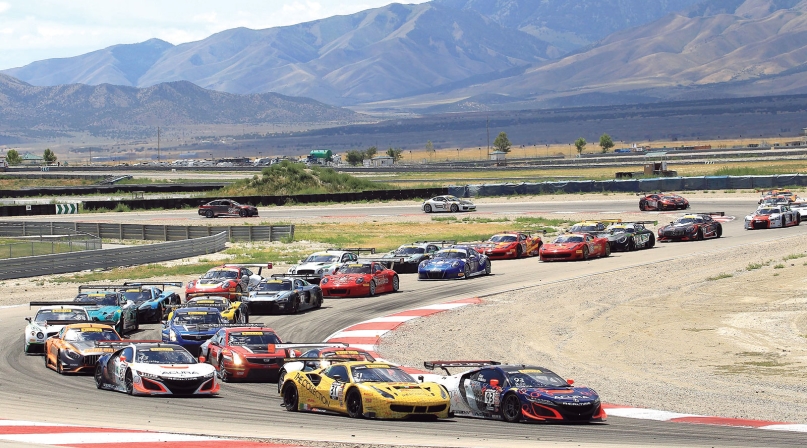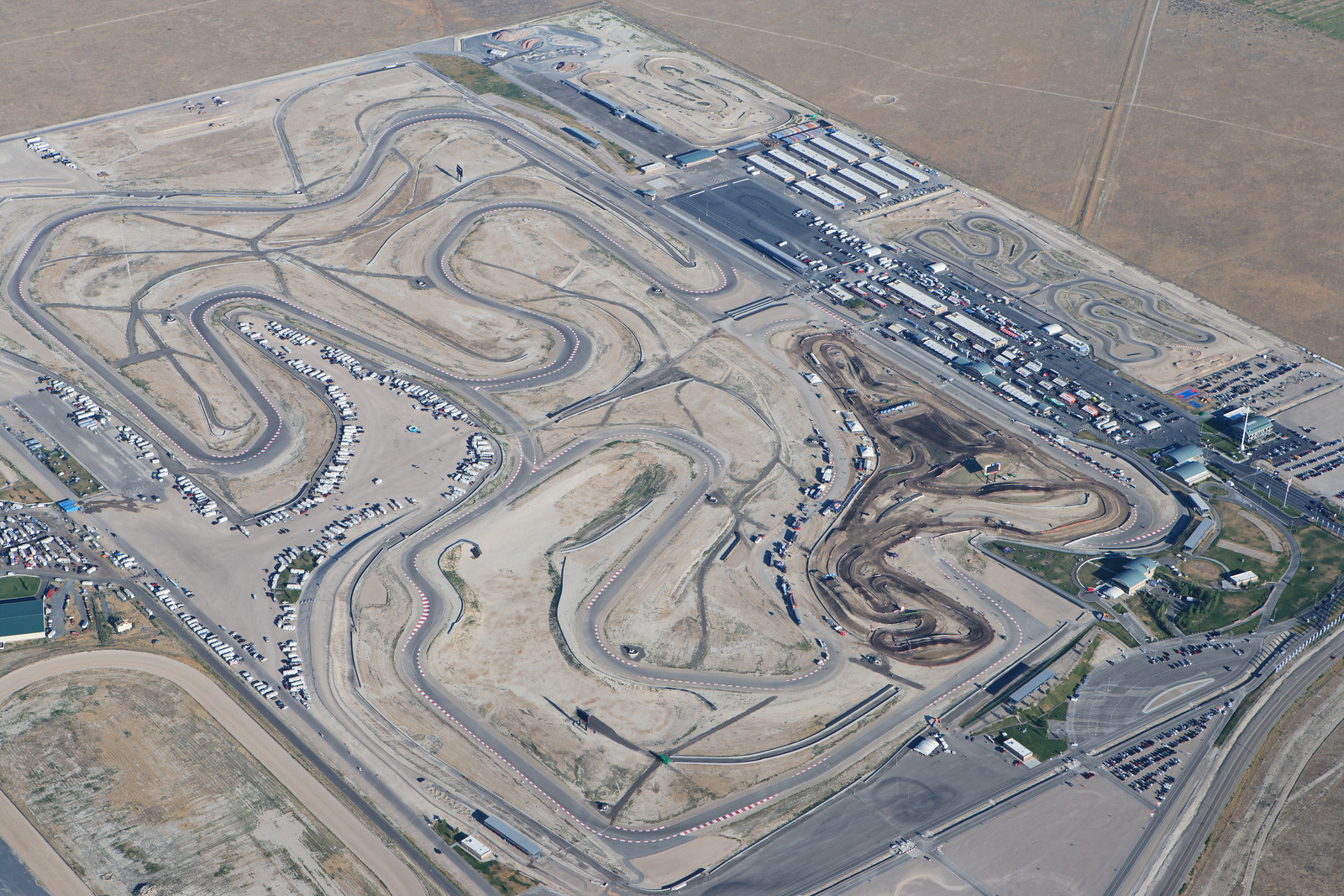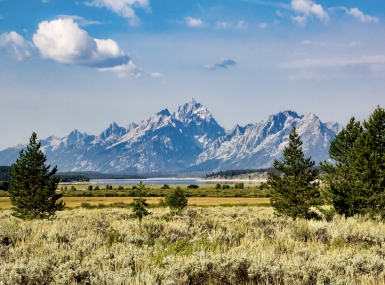Utah county offloads inherited racetrack

Key Takeaways
Some spectators come to auto races to see crashes. Tooele County, Utah wound up in a front-row seat for a big one when it inherited a racetrack of its own.
What is now the Utah MotorSports Campus started as a lark for businessman Larry Miller, who owned car dealerships and the NBA’s Jazz. The 4.4-mile road racing circuit became a much larger enterprise, totaling 511 acres, with a driving school, a restaurant, event space and more, to the point where it became an economic driver for the county bordering the Great Salt Lake. In the track’s first year, the MotorSport World Expo named it the Motorsport Facility of the Year.
But three years after the facility opened in 2006, Miller died, and a messy succession followed.
Learn more
Tooele County had been working on a land swap with the soil conservation district that owned the land, with the intention of selling it to the Miller family. In the meantime, the county leased the land to the Millers.
“The lease was supposed to renew every 10 years, so we went into this (2015) meeting thinking it was going to be a formality,” said Commissioner Shawn Milne. “Turns out it wasn’t. It ended up being a totally different conversation.”
Following Miller’s death, his family assembled a board of directors that eventually determined that the racetrack didn’t fit the business’ long-term plans. The meeting ended with Miller’s business making arrangements to hand over the keys to the county and washing their hands of the track.
As the commissioner in charge of economic development and tourism, the facility became Milne’s baby.
“We don’t know the first thing about running a racetrack, so (the commissioners) all knew we wanted to sell it. We all knew we didn’t have the acumen or the professional bandwidth to operate this facility,” he said. “We’re not a large enough county to have a public information officer or someone who can dedicate their time to messaging and negotiating, so it fell to me.”
Rules of the road
The sale process was a lot like four people crammed into a driver’s seat. Tooele County wanted to steer toward long-term growth and stability, with two potential buyers yanking on the steering wheel in each director. The Ford High-Performance Racing School, one of the tenants that had three years left on its lease, stepped on the gas, wanting a sale by August. And they wanted approval of the buyer.
“They didn’t want to have the Ford Performance Racing School at the Toyota 500 track,” Milne said. “…but they were leasing $1 million of space per year, so it was someone we had to keep happy. The last thing we should do is lose them.”
The county and its consultant identified two buyers separated by $2.5 million between their bids. Buyer A offered $22.5 million and planned a housing development nearby. Buyer B offered $20 million, with plans to upgrade the facility and perform deferred maintenance. Though Buyer B offered less cash, the commissioners and their consultant favored their long-term plan for the property.
Then a circuit court judge pulled the emergency brake.
Citing a state law that required governments to sell to the bidder with the most cash in hand, Buyer A made his case and the judge went for it, voiding the first sale.
Tooele County disputed the judge’s interpretation of the law, wishing to have some choice in the matter of selling an asset that had become so central to the county’s economy. “This isn’t an issue like selling a fully depreciated vehicle, where we don’t care what happens after we sell it,” Milne said. “This is an operable business unit that we don’t own but we do own the hardware the business uses. It makes a huge difference to our local economy and the judge was trying to equate it to something completely different.”
All the while, the county was left in possession of a racetrack that is losing money. That lasted three years and led to almost $9.4 million in operating losses. Buyer B — Mitime Utah Investment — operated the facility in the interim.
“The track always lost money, but the Millers had other businesses that were profitable, so it balanced out in a way that doesn’t work for a county government,” Milne said. “If we were not a governmental unit, none of this would have been an issue. A private sector transition could have looked as messy, hasty and nobody would ever be the wiser.”
Ultimately, the law that hamstrung the county changed with a new law in 2018 addressing the disposal of county property and Tooele County was able to sell the facility to Mitime in late 2018 for $18.5 million, after paying the losing suitor a $1.5 million settlement and spending another $300,000 in litigation costs.

The spectators
The legal drama played out partially in public, partially in closed session. Some questioned whether the county Board’s decision to sell to the lower bidder indicated a conflict of interest, a charge the state’s audit quashed.
“You have members of the public who are prone to conspiracy theories who think that everything conducted on behalf of the public ought to see the light of day,” Milne said. “Real estate negotiations are not going to be conducted with a Facebook live.”
The longer the struggle continued, the bigger the black eye for the county.
“It was a media challenge for us,” Milne said. “If we have trouble convincing a judge who follows technical matters professionally, imagine how hard it is to boil this down to a 20-second bite for the public.”
Milne spent time updating groups individually about the process and saw positive results.
“The vast majority of racers and stakeholders overwhelmingly supported us,” he said. “The Chamber of Commerce helped. They recognized the economic impact. Those who had more business acumen and knew that negotiations are often time-privy to confidentiality for a reason, they would get it.”
A 2019 report by the state’s legislative auditor general criticized the county, pointing out that $9.36 million in operating losses over three years and $1.8 million in litigation costs led to a gain of just $7.36 million from the raceway’s sale.
The report recommended the county commission consider ways to provide greater transparency in the way it does business. In the county’s response to Auditor General Kade Minchey, Commission Chairman Tom Tripp said the county will:
- develop a policy to guide meeting protocol and explain how meetings are classified as legislative or administrative
- draft a policy to address record retention
- revise county purchasing policy, and
- hire an outside auditor to revise management practices.
The report further criticized the county’s oversight of the raceway, on which Milne pushed back in a letter to Minchey in May 2019, pointing out that the audit ignored the long-term economic benefits Tooele County tried to harness in choosing its buyer and the report “interpreted legal theories… to find causation where there was none.”
Milne pointed out in the county’s reply that the situation was unique among counties. “While it may be normal or acceptable for local government entities to own and manage swimming pools, golf courses and recreational facilities, it is not standard for counties to own and operate world-renowned racetracks,” he wrote.
Two of the three commissioners in office retired just after the sale was completed, with Milne the only incumbent and hoping to never deal with that again.
“I’d like to write a book about it, because it’s something a lot of government wonks would be interested in,” Milne said. “I’m no Danielle Steel, but it’s pretty interesting.”


Attachments
Related News

Congress Passes Landmark Outdoor Recreation Package
Lawmakers passed the bipartisan EXPLORE Act (H.R.6492) on December 19 to boost outdoor recreation opportunities on public lands for county residents and visitors and aid gateway communities

Counties Applaud Passage of WRDA/EDA Package
Omnibus package will advance county interests in economic development, water infrastructure

Congressional movement on flawed workforce reauthorization legislation
The U.S. House Education and Workforce and U.S. Senate Health, Education, Labor, and Pensions Committee leadership released their bipartisan, bicameral agreement to reauthorize the Workforce Innovation and Opportunity Act (WIOA) – A Stronger Workforce for America Act. Congressional leadership is now working to gain support for the negotiated bill text during the lame duck session.
